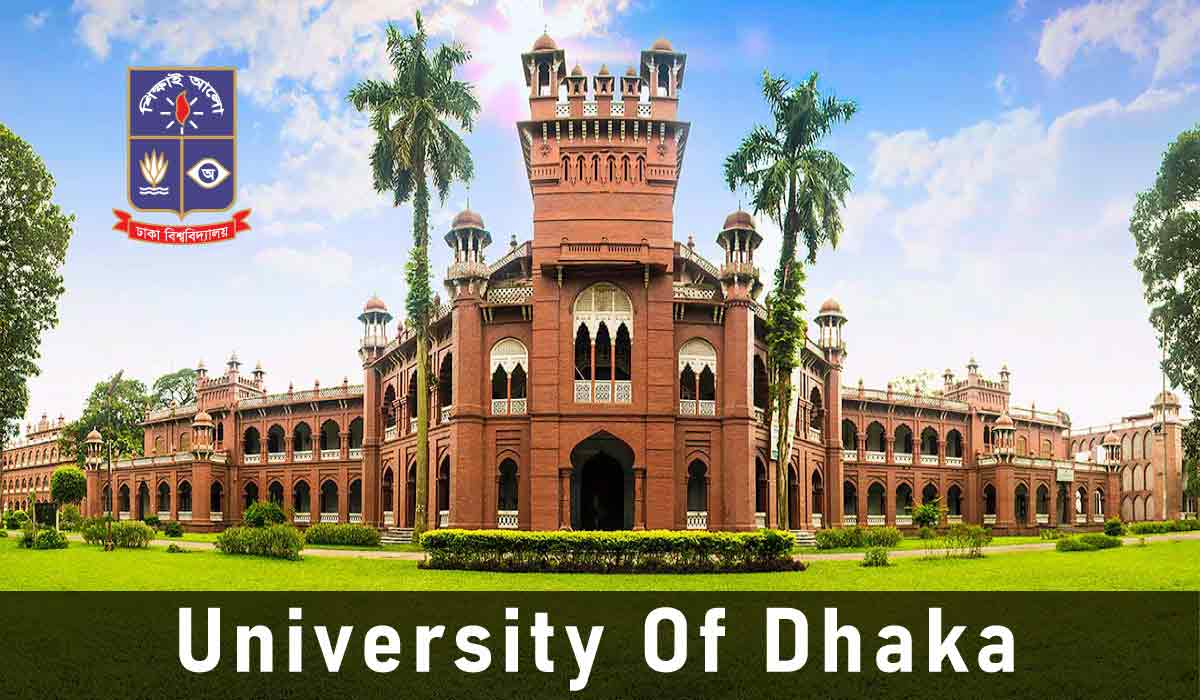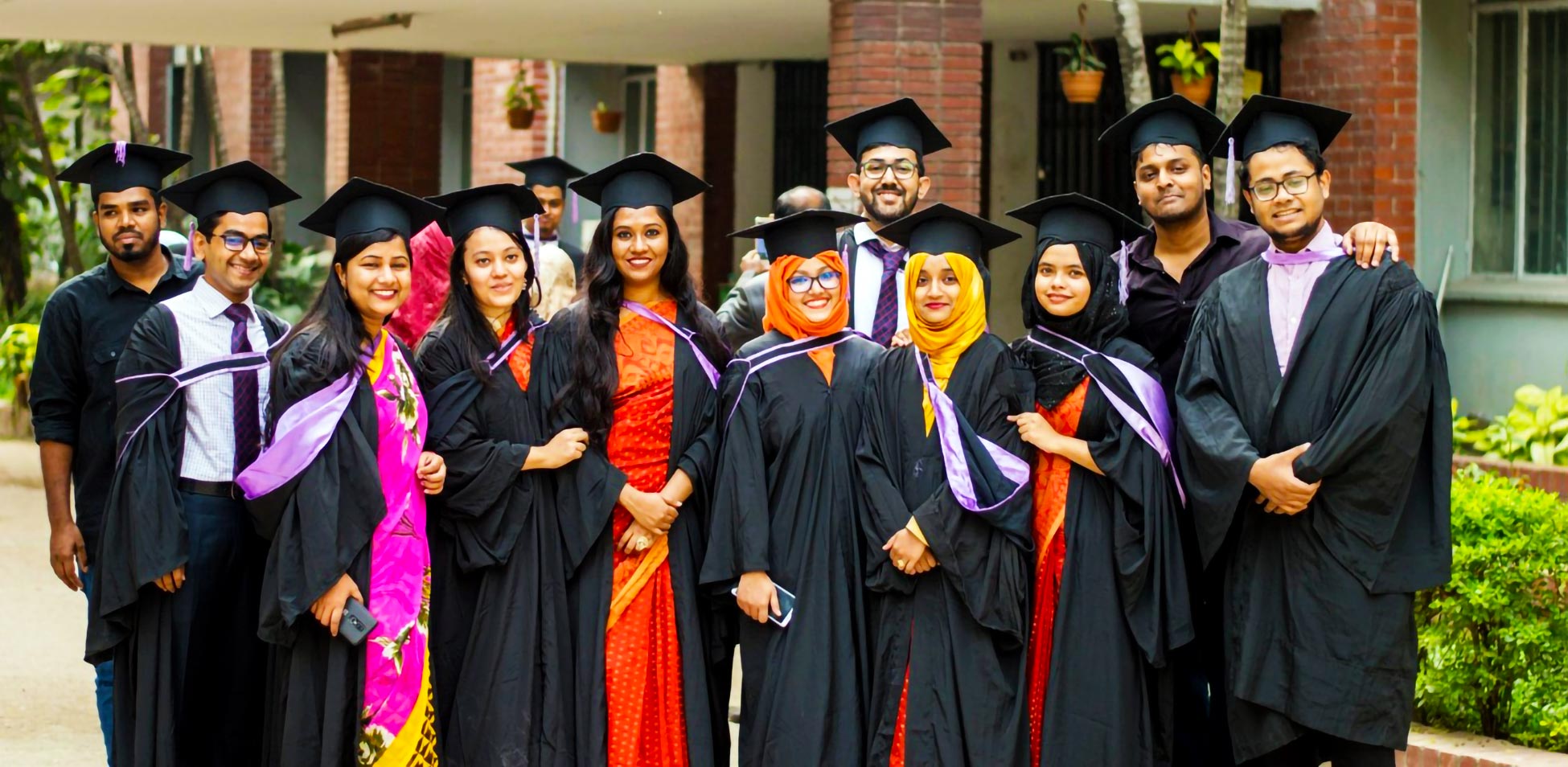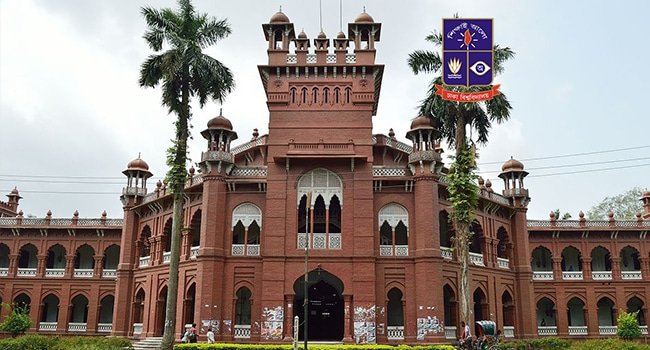In Bangladesh, the University of Dhaka, sometimes known as “Dhaka University” or just “DU,” is a major institution of higher learning. Founded in 1921, DU has been more than just an academic institution; it has played a pivotal role in shaping the nation’s intellectual and cultural landscape. Notably, it was central to significant historical events like the Language Movement of 1952 and the Liberation War of 1971, embedding the university deeply into the fabric of Bangladesh’s identity as a symbol of national pride and resilience.
Over its long history, DU has continually evolved to meet the demands of a changing society, all while upholding its standards of academic excellence. Located in the heart of Dhaka, its campus blends tradition with modernity, creating a vibrant environment for learning and personal growth. With more than 80 departments and institutes spread across 13 faculties, DU offers a broad range of undergraduate and postgraduate programs, catering to diverse academic and career goals.
The university’s reputation extends globally, drawing students, scholars, and researchers from around the world. Its faculty includes leading academics and researchers who contribute to a wide array of fields, fostering an atmosphere of innovation and critical inquiry. DU’s research not only advances knowledge but also addresses key social, economic, and environmental challenges in Bangladesh and beyond.
In this article, we’ll explore the University of Dhaka’s rankings, tuition fees, and course offerings, providing insight into what makes DU a premier choice for students seeking a transformative educational experience. This exploration reveals why DU remains a key player in higher education in Bangladesh, preparing future leaders to drive the country forward.
Read Also: University of Technology Sydney (UTS)
Table of Contents
ToggleUniversity of Dhaka: Rankings

One of Bangladesh’s top universities, the University of Dhaka is renowned for having a big impact on both academia and culture. While its global visibility may be influenced by regional focus and ranking methodologies, its reputation remains robust both locally and regionally.
- National Rankings: The University of Dhaka is Bangladesh’s top higher education institution, renowned for its century-long legacy of excellence in teaching and research. Its prestigious reputation is bolstered by a competitive admissions process and rigorous academic standards, reflecting its significant role in national history and contributions to social justice.
- Global Recognition: Although the University of Dhaka might not often feature in global rankings like QS or THE, it has a strong reputation in South Asian studies, development, and postcolonial research. Its international partnerships enhance its global presence through student and faculty exchanges, joint research, and academic collaborations. The university’s dedication to social impact and regional development sets it apart on the world stage.
- Regional Recognition: The University of Dhaka is highly respected in South Asia for its contributions to education, research, and cultural development, especially in arts, humanities, social sciences, and natural sciences. Its graduates often attain influential roles in academia, government, and industry, reinforcing its leadership in the region. The university’s impact is further seen in its collaborations with South Asian institutions and its active role in regional academic networks and conferences.
Read Also: University of British Columbia Rankings, Fees & Courses Details
The Cost of Tuition at the University of Dhaka
The University of Dhaka is committed to providing affordable education, making it an accessible option for students from diverse socioeconomic backgrounds. The university’s fee structure is designed to minimize financial barriers while maintaining high academic standards. This commitment to affordability is reflected in the relatively low tuition fees for both undergraduate and postgraduate programs, particularly for Bangladeshi students.
Undergraduate Programs
1. Bangladeshi Students: The tuition fees for undergraduate programs are remarkably affordable, ranging from BDT 10,000 to BDT 30,000 per academic year. This low fee structure is made possible by significant government subsidies and the university’s mission to offer higher education to a wide segment of the population.
Despite the low fees, the University of Dhaka maintains high academic standards and offers a broad range of programs across various disciplines, including arts, sciences, business, and law. The affordability of these programs allows students from all over the country to access quality education, which is essential for fostering national development and social mobility.
2. International Students: International students are welcomed at the University of Dhaka, with tuition fees set between USD 1,000 and USD 3,000 per academic year. These fees are still relatively low compared to international standards, making the university an attractive option for students seeking affordable education abroad.
The university provides a vibrant and diverse campus environment, where international students can experience the rich cultural heritage of Bangladesh while pursuing their academic goals. The lower cost of education does not compromise the quality of learning, as the university offers a robust curriculum and access to experienced faculty members who are leaders in their fields.
Postgraduate Programs
1. Bangladeshi Students: The tuition fees for postgraduate programs at the University of Dhaka vary depending on the department and the level of study but generally range from BDT 15,000 to BDT 50,000 per academic year. These fees are designed to be accessible to a broad range of students, enabling them to pursue advanced studies without incurring significant debt.
The university offers a wide array of postgraduate programs, including master’s degrees, MPhils, and PhDs, across multiple disciplines. These programs are geared towards developing research skills, critical thinking, and professional expertise, preparing graduates for leadership roles in academia, industry, and government.
2. International Students: For international postgraduate students, tuition fees range from USD 1,500 to USD 4,000 per academic year, depending on the program. These fees are competitive when compared to similar programs offered by universities in other countries, especially in terms of the quality of education and research opportunities available.
The University of Dhaka offers a supportive academic environment for international students, with access to extensive library resources, research facilities, and opportunities for collaboration with local scholars. The postgraduate programs are designed to challenge students intellectually while providing them with the skills and knowledge needed to excel in their chosen fields.
Additional Costs
In addition to tuition fees, students should anticipate additional costs, including admission fees, student welfare fees, examination fees, and living expenses. The cost of living in Dhaka is relatively low compared to other capital cities, making it a financially viable option for both local and international students.
Accommodation costs, whether on-campus or off-campus, are affordable, and the university provides various options to meet different needs. Students should also budget for books, study materials, and personal expenses, which will vary depending on their lifestyle and program of study. Despite these additional costs, the overall expense of studying at the University of Dhaka remains lower than at many comparable institutions, offering excellent value for money.
Read Also: Simon Fraser University: Rankings, Fees & Courses Details
Courses and Programs

The University of Dhaka provides a diverse selection of undergraduate and postgraduate programs across its various faculties and institutes, meeting a broad spectrum of academic interests and career goals. Its curriculum aims to give students a strong academic foundation, develop critical thinking skills, and equip them with practical knowledge to succeed in their chosen fields.
Faculty of Arts
- Undergraduate Programs: The Faculty of Arts offers a Bachelor of Arts (BA) in diverse subjects such as English, Bengali, History, Philosophy, and Islamic Studies. These programs emphasize a deep understanding of cultural, historical, and philosophical contexts, equipping students with analytical and communication skills that are highly valued in various professional fields.
- Postgraduate Programs: At the postgraduate level, the faculty offers a Master of Arts (MA) in various disciplines, including English, Bengali, History, and Philosophy. These courses are intended to give students access to advanced information and research possibilities so they can focus on their areas of interest and participate in scholarly and cultural discussions.
Faculty of Business Studies
- Undergraduate Programs: The Faculty of Business Studies offers a Bachelor of Business Administration (BBA) and Bachelor of Commerce (BCom) in fields such as Accounting, Finance, Marketing, and Management. These programs are structured to provide students with a strong foundation in business principles, preparing them for leadership roles in corporate and entrepreneurial environments.
- Postgraduate Programs: The faculty also offers postgraduate programs, including a Master of Business Administration (MBA), Master of Commerce (MCom), and PhD in Business Studies. These programs are aimed at developing strategic thinking, advanced business skills, and research capabilities, preparing graduates for high-level careers in business, academia, and consulting.
Faculty of Science
- Undergraduate Programs: The Faculty of Science offers a Bachelor of Science (BSc) in disciplines such as Physics, Chemistry, Mathematics, Statistics, and Computer Science. These programs focus on developing a strong understanding of scientific principles and methodologies, with an emphasis on practical laboratory work and research.
- Postgraduate Programs: At the postgraduate level, the faculty offers a Master of Science (MSc) in various science disciplines and a PhD in Science. These programs are designed for students who wish to pursue advanced research in their fields, with opportunities to engage in innovative projects and contribute to scientific advancements.
Read Also: 15 Best Sports Medicine Colleges in US |Best Reviews
Faculty of Social Sciences
- Undergraduate Programs: The Faculty of Social Sciences offers a Bachelor of Social Science (BSS) in subjects such as Economics, Political Science, International Relations, Sociology, and Anthropology. These programs provide students with a comprehensive understanding of social structures, political systems, and economic theories, preparing them for careers in public policy, social research, and international affairs.
- Postgraduate Programs: Postgraduate offerings include a Master of Social Science (MSS) in various disciplines and a PhD in Social Sciences. These programs are geared towards advanced research and analysis, enabling students to explore complex social issues and contribute to policy development and social change.
Faculty of Law
- Undergraduate Programs: The Faculty of Law offers a Bachelor of Laws (LLB), providing students with a thorough understanding of legal principles, practices, and ethics. The program prepares graduates for legal practice, judicial services, and roles in government and international organizations.
- Postgraduate Programs: The faculty also offers a Master of Laws (LLM) and PhD in Law, catering to those seeking advanced legal education and research opportunities. These programs are designed to deepen students’ understanding of legal systems and specialized areas of law, equipping them for careers in academia, legal consultancy, and international law.
Faculty of Medicine
- Undergraduate Programs: The Faculty of Medicine offers a Bachelor of Medicine and Bachelor of Surgery (MBBS), a highly sought-after program that prepares students for medical practice. The program includes extensive clinical training and exposure to various medical disciplines, ensuring graduates are well-prepared for the healthcare profession.
- Postgraduate Programs: Postgraduate offerings include a Master of Public Health (MPH), Master of Surgery (MS), and PhD in Medicine. These programs provide advanced training in medical research, public health policy, and surgical techniques, preparing graduates for leadership roles in healthcare, research, and medical education.
Institute of Education and Research (IER)
- Undergraduate Programs: The Institute of Education and Research offers a Bachelor of Education (BEd) in areas such as Educational Administration, Curriculum Studies, and Special Education. These programs are designed to train future educators and administrators, equipping them with the skills needed to enhance educational practices and outcomes.
- Postgraduate Programs: The institute also offers a Master of Education (MEd) and PhD in Education, focusing on advanced research and professional development in education. These programs aim to prepare graduates for leadership roles in educational policy, curriculum development, and academic research.
Institute of Business Administration (IBA)
- Undergraduate Programs: The Institute of Business Administration (IBA) offers a Bachelor of Business Administration (BBA), a prestigious program known for its rigorous curriculum and focus on practical business skills. The program prepares students for successful careers in business management, entrepreneurship, and corporate leadership.
- Postgraduate Programs: The Master of Business Administration (MBA), Executive MBA, and PhD in Business Administration are among the postgraduate programs offered by IBA.
These programs are designed for professionals seeking to advance their careers, offering a blend of theoretical knowledge and practical application in business strategy, management, and leadership.
Read Also: List of Top MBBS Scholarships for International Students 2024-2025
The University of Dhaka stands as a cornerstone of higher education in Bangladesh, with a legacy that spans over a century. Offering a diverse array of programs across various disciplines, it has become a beacon of academic excellence in the region. The university’s rich history, affordable tuition fees, and strong academic reputation make it an attractive choice for students from Bangladesh and neighboring countries.
Whether pursuing undergraduate or postgraduate studies, the University of Dhaka provides a vibrant and intellectually stimulating environment that fosters critical thinking, innovative research, and leadership development. Its commitment to academic excellence and social responsibility ensures that it continues to play a pivotal role in shaping the future of its students and the broader community.
